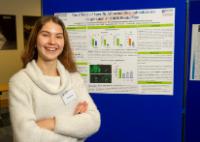2017 Participants
 Irma Lepeseva
Irma Lepeseva
- BSc (Hons) Biomedical Genetics
- The Effects of Specific Mitochondrial Inhibitors on Respiration and ROS production
Mitochondrial Reactive Oxygen Species (ROS) have been recurrently involved in ageing and age-related diseases. While they can cause oxidative damage, ROS are also essential for maintaining cellular homeostasis. Sanz’s laboratory has recently demonstrated that the site at which ROS are generated is homeostasis is central in determining their physiological effects. Increasing ROS levels by inducing reverse electron transport (RET) through respiratory complex I (CI) extends lifespan and protects mitochondrial function.
During my research project, I successfully studied the mechanisms by which RET is generated in the brain of Drosophila melanogaster (fruit fly). Firstly, I used specific mitochondrial inhibitors (chemical drugs) of respiratory complex III (myxothiazol) and IV (cyanide) to prevent electron flow and record any difference in mitochondrial respiration compared to the control. Secondly, I confirmed the results of these experiments using the same inhibitors to measure ROS with confocal microscopy.
In conclusion, blocking CIII and IV results in reduced respiration which explains increased ROS levels.
Funding source: Newcastle University
Supervisor: Dr Alberto Sanz Montero
